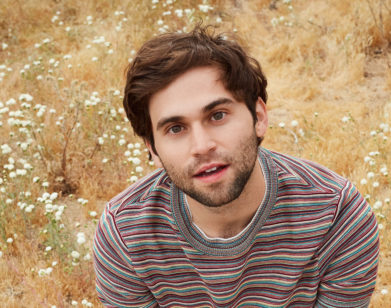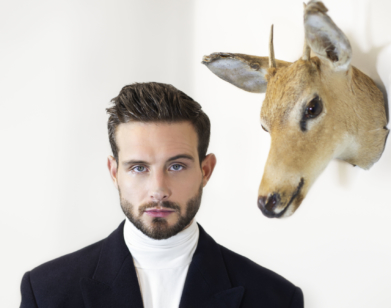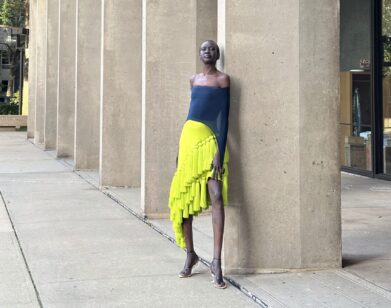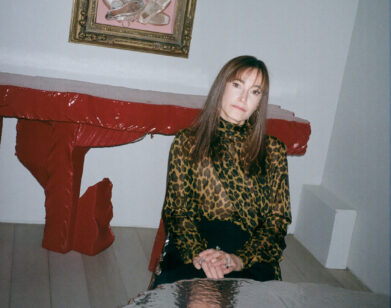zombieland
Hilarie Burton on Living in an Apocalypse Within an Apocalypse for The Walking Dead
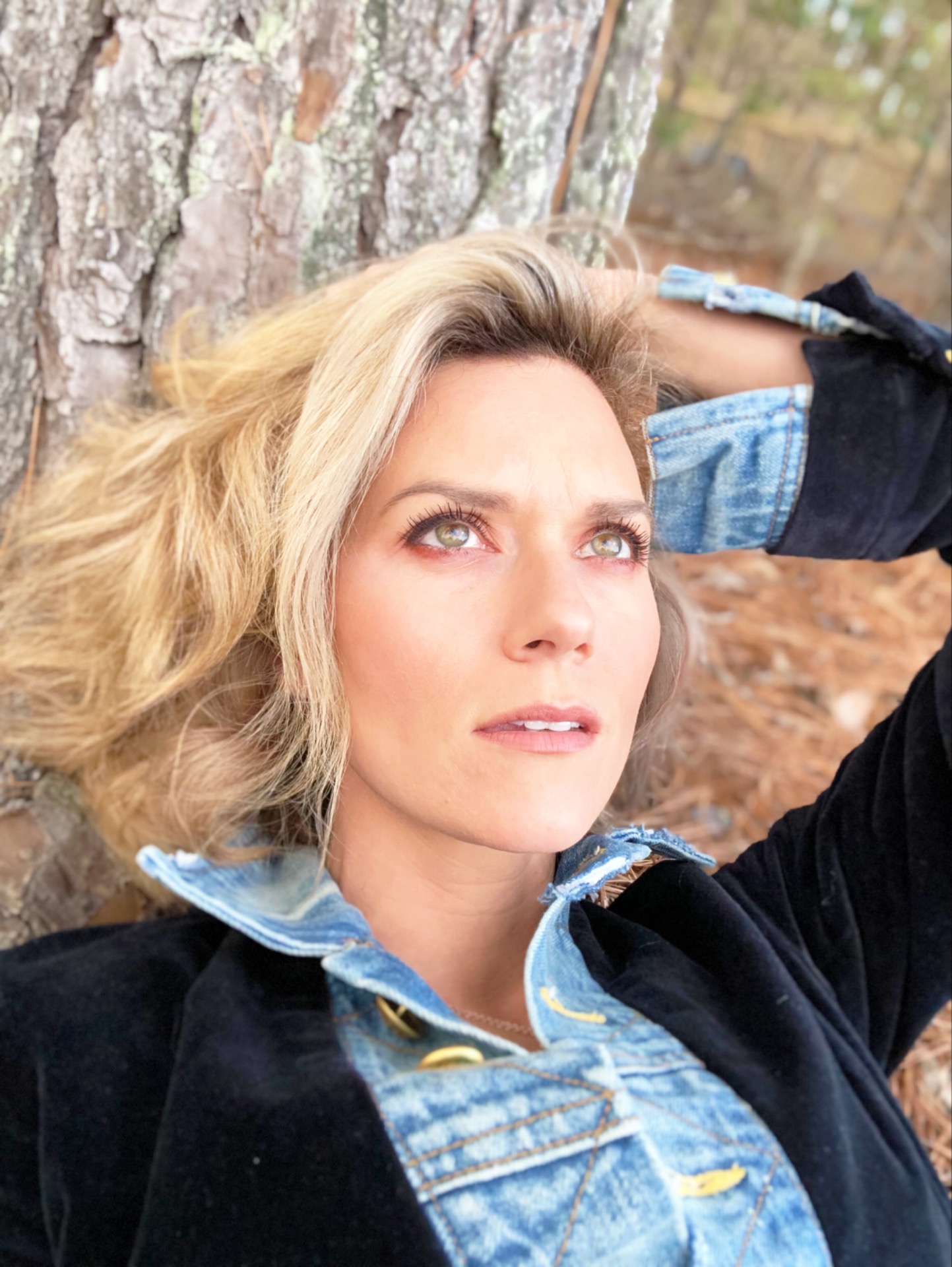
Photo by Hilarie Burton.
Hilarie Burton and I spoke over Zoom in the midst of a pandemic about her upcoming appearance on season ten of The Walking Dead, a show about a post-apocalyptic pandemic, where she plays the dead wife of her real-life husband (Jeffrey Dean Morgan, who plays Negan) and the namesake of the infamous barbed-wired baseball bat, Lucille. The actress, who got her start on MTV’s Total Request Live (TRL) in 2000, has also starred in One Tree Hill, White Collar, Grey’s Anatomy, and the Lethal Weapon series. Speaking from her temporary abode in North Carolina, during an extended COVID-necessitated break from filming The Walking Dead, she was clear and candid. Below, she discusses filming alongside her husband, producing a documentary about the Wilmington 1898 massacre, farming, and living in an apocalypse within an apocalypse.
———
HILARIE BURTON: [Sitting in what looks like a classroom] I’m in my son’s classroom at a toddler table.
BRIAN ALESSANDRO: It’s amazing how everyone’s homes have been converted into schools!
BURTON: Yeah, well, we pulled our son from school so early because my husband was doing a movie in Massachusetts and we were traveling back in February [of 2020], and we were like “This shit is nuts! Why isn’t everybody pulling their kids?” We saw everybody at the airport, at JFK, just like falling apart, and we were like, “I don’t know. This seems like something we should keep you home for.”
ALESSANDRO: Smart move! You’re about to appear on The Walking Dead as Lucille, Negan’s dead wife in presumably flashbacks? How did this happen?
BURTON: The comic books set up the basic gist of Lucille, and Negan has certainly talked about her a lot throughout his arc in the series. Jeffrey [Dean Morgan, Burton’s husband] had always said in jest—maybe it wasn’t in jest, who knows—but he would say out loud, “I want my wife to play Lucille,” and nepotism is certainly a strong force within our industry. And then COVID hit and it was like, “I’m not going to kiss some stranger that I haven’t been quarantined with.” But it was good to work with each other. We had never had scenes together. We had been on the same show—we did Grey’s Anatomy at different times. We did a show called Extant together.
ALESSANDRO: Was it at all weird playing a fictional couple in such a macabre story and setting?
BURTON: You don’t even understand the layers of what we were dealing with. There’s been so much loss this year, let me start with that. And so, doing a story about loss in this current climate was really difficult because we know people who have died this year. We’ve suffered a lot of losses this year and having to ground that in a performance and not just be like a big, huge mess on set was hard. On top of all of that, to keep us safe for the filming, they had us quarantined living in the neighborhood that The Walking Dead shoots in. Alexandria is a little subdivision of houses with a big, huge wall, and it’s apocalyptic. There’s trash everywhere, and the water tower and all the sets that you see on television. We lived in Rick Grimes’s house. There were bullet holes in my child’s closet door.
ALESSANDRO. Wow.
BURTON: And big, huge pieces of dry wall missing from stunts that had gone awry. So, we were living in a real apocalypse in the real world living in a rented house in a fake apocalypse and filming the beginning of a pandemic that has been on TV for ten years. There were so many layers of weirdness.
ALESSANDRO: It’s sort of meta! And surreal.
BURTON: It was so meta! And on top of all of that, Halloween happened, so there was trick-or-treating going on. And we were there for the election with Georgia turning blue and all of the upheaval and violence that came with that.
ALESSANDRO: What a moment.
BURTON: To be surrounded by those walls on set every day, and to know what was going on in the real world, was every bit as important and dramatic as what we were making TV about. But our son learned to ride a bike!
ALESSANDRO: On set?
BURTON: We live on a farm in Upstate New York, and so there’s gravel roads, which is not conducive to bike riding. And so he had this entire neighborhood [the Alexandria set] all to himself and would just take off after virtual school. He learned to ride this cool kid grown up bicycle while dodging debris from the last Whisperers War.
ALESSANDRO: What a cool story for him when he grows up to tell people. “I learned how to ride a bike in the middle of The Walking Dead apocalypse while dealing with this real apocalypse.”
BURTON: [Laughs] It was strange! We took a lot of pictures. Seeing my children play on this rusty playground equipment that is a set piece, but that’s what they played on every day after the crew left, was … strange.
ALESSANDRO: I can’t imagine! What has it been like to be at the center of one of the biggest casting decisions in the fan boy and girl universe?
BURTON: I’ve been really nervous about it. There have been conversations about whether or not Negan is a villain and if you had followed Negan’s journey from the beginning the way you followed Rick Grimes, perhaps people would have been more sympathetic to the way he handled things when he was introduced. And so, my role as Lucille is to validate a lot of Negan’s life choices. I think, and I’m probably a little biased, but I dig the Negan of it all. I get him. I’m attracted to him. He’s a terrible dude, but we all turn into terrible people when met with dangerous circumstances. That weighed on me heavily. I think playing a character who is ill during a time when so much of our country has been faced with illness and loss really weighed on me heavily. When you’re dealing with losing your most cherished person, there’s going to be a big percentage of the fan base that has dealt with that in the last year. It’s recent history.
ALESSANDRO: Very fresh wounds.
BURTON: I didn’t want to cheapen anything for them. So, it’s messy. It’s a messy story.
ALESSANDRO: Compelling, too, though. When do your episodes air? In how many episodes does Lucille appear?
BURTON: Just one episode. They do these bottle episodes that are wonderful. Normally when you’re filming a TV show, particularly a big TV show, if you work a 12-hour day, it’s like, “Oh my god, we’re gonna get home! This is great! It’s the shortest day ever!” Normally, it’s like 15-16-hour days and that’s normal, but given the restrictions of COVID they were only allowed to shoot ten-hour days. And so, we did these bottle episodes where the scenes are longer. It’s like doing a play. Jeffrey and I would learn all our words for that day and perform everything like a play in order to get it done quickly and efficiently, and it really change the pace of the work. It was like we were putting on a play for 30 crew members every day. It didn’t feel like we were making a television show.
ALESSANDRO: It’s remarkable that anyone is getting anything done right now, let alone these kinds of large-scale productions.
BURTON: I was so nervous, but I never felt safer, because the daily testing they did gave me such peace of mind. I go to the food line now and I’m so worried that I’m bringing something home, but I knew in Georgia whether or not I had something because the production made it such a priority to take care of everyone from the top down.
ALESSANDRO: When does your episode air?
BURTON: I believe it’s April 4th. That’s the tentative date right now. It’s the last of the six bottle episodes.
ALESSANDRO: Can you say yet if Lucille’s coming back?
BURTON: Dude, who fucking knows?! [Both laugh] You know! It’s The Walking Dead! I was just so flattered that they invited me to begin with. I know Angela [Kang, The Walking Dead showrunner] as my husband’s boss, a cool person to hang out with. She’d come to the farm before the pandemic hit. She was the last guest we had at the farm. And so, her and Scott Gimple [the chief content officer of The Walking Dead] believing in me to be able to handle that really meant a lot.
ALESSANDRO: Let’s shift gears for a bit. You’ve recently co-produced a documentary about the Wilmington massacre called Wilmington on Fire 2. What brought you to this project?
BURTON: I reached out to Chris [Everett, producer and director of Wilmington on Fire 2] after I had seen [Wilmington on Fire] and a number of actor friends from the Wilmington [North Carolina] area told me that I had to watch this. So, I watched it, and it was really eye-opening. I had lived in the historic district of Wilmington. I had lived two houses down from the lawyer who represented all the white supremacists who overtook the government in 1898. I’d been inside his home. I had no idea I was treading in this place where someone truly evil lived. Someone who had justified their actions, and changed the course of Wilmington’s history. It really shook me that I didn’t know about it. I felt stupid. And so, I reached out to Chris and asked him to come on my Instagram and give a talk about it.
ALESSANDRO: I watched it! You were both great!
BURTON: Oh, you did!
ALESSANDRO: Yeah!
BURTON: I just think sitting down and talking about stuff is a really healthy way to educate people in a way that isn’t preachy. Chris is a very good storyteller. He knows what he wants to say with his work. And so, he told me he was doing the sequel, and I said, “Well, here, let me throw some money at you, and then also let me help you drum up the rest of your funding.” I didn’t want to impose in the storytelling part of it because I really believe in how he is telling these stories, but I’ll cheerlead all day long. That’s the job of some producers. Be the hype-man!
What’s also important about Wilmington on Fire is that it specifically addresses reparations, which is not something that white communities talk about. It is very taboo. The sentiment is, “We solved those problems! Generations have gone by. I didn’t do this. Why do I have to pay for it?” And what I think is so important about the Wilmington on Fire story is that it is recent history. I knew my great-grandmother who was alive when that happened. You know, we’re not so far removed that we can’t trace the families who were directly affected by it, and it’s proven that reparations do help. And I think this chapter two lays out a very compelling argument for why we should take responsibility for what happened in 1898. I got a lot of heat on social media since last summer when I really started speaking up about this stuff. People accuse you of being a coastal elite. I literally just put out an entire book about how I left Los Angeles and moved to a rural farming community [The Rural Diaries: Love, Livestock, and Big Life Lessons from Down on Mischief Farm]. My county couldn’t be more Republican. And I grew up in Virginia, I grew up on gun ranges, my father was in the military. I grew up surrounded by Republicans. And there is a major difference between the Republican party I remember as a child and what has manifested as a result of the Tea Party movement. White women—we’re 55 percent of that vote for Trump, and so it’s the job of white women who understand the community to speak up against it.
ALESSANDRO: How have the trolls responded to your rebuttal?
BURTON: [Laughs] Yeah, you know, they’re not into it. I get a lot of, “We thought you were a nice girl.” Which baffles me! I’ve never played a nice girl. I don’t think I’ve ever been nice in any of my interviews. I’m always kind of a surly lady. I don’t know where that mythology came from. I’m not a nice girl. I say exactly what I think, and a lot of the trolls have a problem with it. And that’s okay. I think it’s important to have a line in the sand when it comes to things you feel passionately about. That is something that is a dealbreaker for me.
ALESSANDRO: It also says a lot about you to have the right enemies.
BURTON: Who was it that said, “Show me a man with no enemies and I’ll show you a man with no conviction”?
ALESSANDRO: It might have been Hemingway or Roosevelt. A writer or a politician like a hundred years ago. [Ed. note: it was Paul Newman: “A man with no enemies is a man with no conviction.”]
BURTON: It was one of those grumpy old guys, but yeah, we’ll co-opt it. It’s rough because you want to maintain an open line of communication with the people you feel can hear what you’re saying and know when to draw the line when someone is so indoctrinated that they’ve fallen in with hate. Or conspiracy. And that has become very difficult to navigate.
ALESSANDRO: With regard to your social media, which is activism-heavy, is it that when you have such a platform and audience it’s hard not to say something?
BURTON: I am in a position where if I never work again, my husband works a lot. It’s a position of privilege. And to not use that privilege seems really irresponsible. We all get different tools, and mine, I guess, has been a big mouth. Not a “nice girl,” remember?
[Both laugh]
ALESSANDRO: “Hilarie Burton is NOT a nice girl!”
BURTON: Who the fuck told people I was?! I am on the board for Astor Family Services in Rhinebeck, New York, which is a mental health facility for children who have been dealt a really bad hand. These are kids who are dealing with trauma. You would be amazed how little these professionals are paid to take care of these at-risk kids, and that bothered me.
ALESSANDRO. I hear you. And I have to say thank you for that. My background is in clinical psychology and I taught at an at-risk school in Queens for ten years, so I know firsthand the perils and the hardships of it, and it’s very powerful what you’ve done to help facilitate what they do.
BURTON: Right on. Thank you!
ALESSANDRO: I’ve seen and read interviews with you over the course of the last 15-20 years, and you’ve always struck me as very grounded, unfazed by success and celebrity. To what do you attribute your perspective?
BURTON: That’s really nice of you to say because I don’t take that lightly. That’s a slippery slope in this business. I have certainly fallen prey to it in my life. I think working at MTV as a teenager was probably the best education I could have gotten in our business because I saw the biggest stars in the world come in with their managers and agents and publicists and entourage and then a year later, they would come back with nobody and there would be no kids out in Times Square, and no one would give a shit anymore. It’s all so fleeting and it’s so fake and I’ve watched so many people trade in the most intimate moments of their life for magazine covers, and so I never wanted to cheapen the things I really loved with that. I’ve tried to remain really transparent about the bad stuff, too. I wrote the book and I keep getting feedback—“Oh, you talk about your miscarriages! Oh, you talk about bickering with your husband! Oh, you talk a lot about the messy stuff!” I think it’s so important to keep the bar really low. You run the risk of disappointing yourself when you sell the façade. Look, I’m gonna fuck up a lot, but if I’m upfront about it, then fine!

